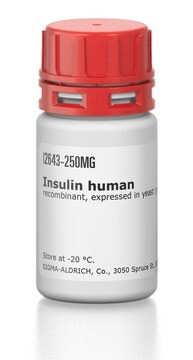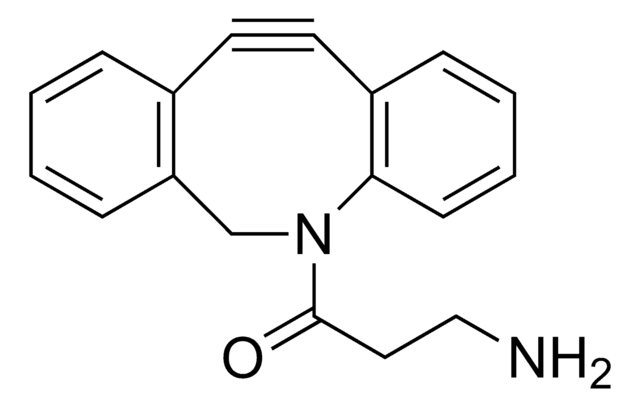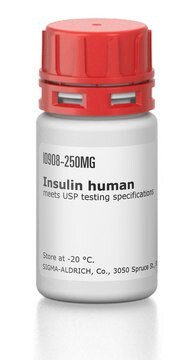SRP0221
PTPIA2 Active human
recombinant, expressed in E. coli, ≥90% (SDS-PAGE)
Sinónimos:
ICA512, Islet cell antigen 2, PTPRN, Protein tyrosine phosphatase-like N, R-PTP-N
Iniciar sesiónpara Ver la Fijación de precios por contrato y de la organización
About This Item
Código UNSPSC:
12352200
NACRES:
NA.32
Productos recomendados
origen biológico
human
recombinante
expressed in E. coli
Análisis
≥90% (SDS-PAGE)
formulario
aqueous solution
mol peso
58.8 kDa
envase
pkg of 20 μg
condiciones de almacenamiento
avoid repeated freeze/thaw cycles
concentración
>0.02 mg/mL
Nº de acceso NCBI
Nº de acceso UniProt
Condiciones de envío
dry ice
temp. de almacenamiento
−70°C
Información sobre el gen
human ... PTPRN(5798)
Descripción general
PTPRN (protein tyrosine phosphatase, receptor type N), more commonly known as IA-2 (insulinoma-associated protein 2), is a transmembrane protein of the PTP family. It was initially identified as a major autoantigen in type-1 diabetes mellitus. In neuroendocrine cells, it resides in the secretory granules. It is a multi-domain protein with intracellular, transmembrane and extracellular domains, and its intracellular region contains a pseudocatalytic domain. It gets processed multiple times during its life cycle, and its different parts are exposed to different cellular and tissue regions such as nucleus, cytosol, organellar lumen in the secretory pathway, extracellular pancreatic islet space, and membrane compartments. This gene is localized to human chromosome 2q35, and codes for a protein of 979 residues.
Protein tyrosine phosphatase. (PTP-IA2, ICA-512), Catalytic domain, (amino acids 693- 979), (Gene bank accession no. NM_002846), with N-terminal GST tag, MW = 58.8 kDa, expressed in an E. coli expression system.
Aplicación
Useful for the study of enzyme kinetics, regulation, and to dephosphorylate target substrates.
Acciones bioquímicas o fisiológicas
PTPRN (protein tyrosine phosphatase, receptor type N) is cleaved at the cytosolic domain during insulin secretion. The cytosolic domain is relocated to nucleus where it promotes insulin gene transcription. This protein plays important role in hormone and neuropeptide secretion. This protein is crucial in controlling the dense core vesicle number in β cells and glucose-induced and basal insulin release. PTPRN null mice show reduced dense core vesicle (DCV) number, abnormal insulin secretion, female infertility, behavioral alteration, and circadian dysregulation.
Definición de unidad
One unit will hydrolyze 1 pmol 6, 8-difluoro-4-methyl umbelliferyl phosphate (DiFMUP) per minute at pH 6.3 and 30°C.
Forma física
Formulated in 25 mM Tris-HCl, pH 8.0, 75 mM NaCl, 0.05% Tween-20, 50% glycerol, 2 mM EDTA, 1 mM DTT, and 10 mM glutathione.
Nota de preparación
Thaw on ice. Upon first thaw, briefly spin tube containing enzyme to recover full content of the tube. Aliquot enzyme into single use aliquots. Store remaining undiluted enzyme in aliquots at -70°C. Note: Enzyme is very sensitive to freeze/thaw cycles.
Certificados de análisis (COA)
Busque Certificados de análisis (COA) introduciendo el número de lote del producto. Los números de lote se encuentran en la etiqueta del producto después de las palabras «Lot» o «Batch»
¿Ya tiene este producto?
Encuentre la documentación para los productos que ha comprado recientemente en la Biblioteca de documentos.
Structure of the mature ectodomain of the human receptor-type protein-tyrosine phosphatase IA-2.
Primo ME
The Journal of Biological Chemistry, 283, 4674-4681 (2008)
The dense core transmembrane vesicle protein IA-2 is a regulator of vesicle number and insulin secretion.
Harashima S
Proceedings of the National Academy of Sciences of the USA, 102, 8704-8709 (2005)
Tao Cai et al.
Acta diabetologica, 52(3), 573-580 (2014-12-22)
IA-2 is a transmembrane protein found in the dense-core vesicles (DCV) of neuroendocrine cells and one of the major autoantigens in type 1 diabetes. DCV are involved in the secretion of hormones (e.g., insulin) and neurotransmitters. Stimulation of pancreatic β
María E Primo et al.
PloS one, 6(9), e24191-e24191 (2011-09-22)
ICA512 (or IA-2) is a transmembrane protein-tyrosine phosphatase located in secretory granules of neuroendocrine cells. Initially, it was identified as one of the main antigens of autoimmune diabetes. Later, it was found that during insulin secretion, the cytoplasmic domain of
Nuestro equipo de científicos tiene experiencia en todas las áreas de investigación: Ciencias de la vida, Ciencia de los materiales, Síntesis química, Cromatografía, Analítica y muchas otras.
Póngase en contacto con el Servicio técnico




